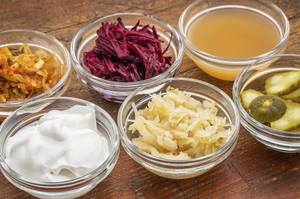
Caring for our Microbiome
Keeping our Microbiome Healthy

Healthy Microbiome
Way back when, Hippocrates, the father of medicine said that “all disease begins in the gut.” Our gut bugs create an ecosystem in the gut! Our gut microbiome help us digest, absorb and assimilate nutrients in our food. They are also part of our primary immune system AND they make neurotransmitters that affect our mental status.
Nothing feels right when your gut microbiome is out of order. Many Americans today suffer from digestive issues and many can be helped by supporting the gut microbiome. We tend to give microbiome support with all of our patients! In our opinion, the microbiome is the foundation to the health of our bodies. With good microbiome support, there are usually benefits such as less brain fog, more energy, fewer cravings, less pain, clearer skin and more.
What is the Microbiome?
Microbiome is one of many names referring to the living ecosystem of micro-organisms that live in and on the human body. Other terms for the microbiome may be microbiota, probiotics, good gut bugs, gut bacteria, intestinal flora, etc. Humans have a HUGE collection of other organisms in our body. In fact, we have ten times more microbial cells than human cells, and 100 TIMES more microbial genes than human genes!
The intestinal tract is the area of the body that is especially rich with these microbes. The human intestinal tract is made up of 400-1,500 different microbial species, and it’s a delicate balance between beneficial, harmful and neutral microbes.3
What Does a Healthy Microbiome Do?
- Aid in digestion and absorption of food
- Keep our intestinal lining intact (i.e., prevention of “leaky gut” which is when you have holes in the lining of your intestinal tract that allows food, bacteria and other things from your intestines to escape into your blood stream)
- Support the immune system, brain function, and much more
Warning Signs of Microbiome Imbalance
- Heartburn
- Gas
- Bloating/cramping/pain
- Indigestion
- Constipation
- Diarrhea
- Early fullness
- Nausea/vomiting
- IBS
- Inflammatory bowel disease: Crohn’s, colitis
- Colon cancer
- Brain fog or memory loss
- Anxiety and depression
- Autism, ADHD
- Joint or muscle pain
- Autoimmune diseases like Hashimoto’s (low thyroid function), rheumatoid arthritis, multiple sclerosis, etc.
- Obesity
- Frequent illnesses and infections
- Asthma
Did you know that 60% of our microbial diversity is impacted by our dietary choices, and our microbes are relatively quick to adapt and shift to changes in diet. Food is the best source of medicine that we have.
Foods and Supplements for a Healthy Microbiome
- Whole vegetables and fruits – The different fibers (i.e., prebiotics) in our foods provide fuel and sustenance to all the different species of gut microbes.
- Aim for 25-30g of fiber per day (as an example, the following combination equals 30g fiber: 1 c. kale, ½ c. great northern beans, ½ c. onion, ½ c. brown rice, 1 T. ground flax seeds, 1 c. green beans, 2 c. cabbage, 3 apricots, 1 orange)
- Aim for 1-3 cups of vegetables at EVERY MEAL, and a small piece of fruit or berries at snacks
-

Probiotic Rich Foods
Fermented foods – Rich in probiotics (the good bacteria), foods such as whole-milk yogurt or kefir, sauerkraut, kimchi, kombucha, fermented vegetables (such as carrots and beets) support a healthy microbiome. Sauerkraut or kimchi on a burger or alongside meatballs or a roast is delicious!
- Adequate Vitamin D – While more research into this area needs to be done, the current evidence5 suggests Vitamin D is important for microbial diversity. Get your Vitamin D level checked at your doctor’s office (aim for a level between 50-80ng/mL), and supplement if necessary with 2,000-4,000 IUs per day.
- Daily Probiotics – Taking a probiotic daily helps to ensure you have lots of beneficial bacteria in your intestinal tract. As mentioned above, having a diversity of different beneficial bacteria is best.
Tags: creating a healthy microbiome, hcg diet for weight loss, healthy microbiome and food, human microbiome and food, probiotics and the hcg diet, supplements and the hcg diet
Categories: Body Composition, Eating Well, Food Information, General Wellness, hCG Diet, HCG Diet Weight Loss, Mindful Eating, Uncategorized, Weight Loss
